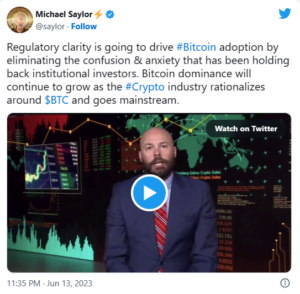The SEC had requested that the money and other assets on the crypto exchange Binance.US trading platform be frozen, but a federal court judge denied that request. The change occurs a day after Binance asked the justices to reject the SEC’s plan in a comparable manner.
Binance.US and the Securities and Exchange Commission have decided to work on a compromise to avoid an entire asset freeze, according to US District Judge Amy Berman Jackson, who made the announcement on Tuesday, June 13.
According to Jackson, the two sides “aren’t that far apart” in terms of how to safeguard the hundreds of billions of dollars in consumer money without having to shut down the exchange while the lawsuit is being litigated.
Jackson stated, “The nitty-gritty of it is handled more effectively by you than by me,” during a hearing yesterday. The judge further stated that she would not be required to make a decision on the SEC’s request to introduce an interim restraining order if the parties voluntarily agree to a settlement.
The SEC requested a court order to freeze the cash at Binance shortly after bringing a case against the company for allegedly breaking federal securities laws.US. The federal securities watchdog said that the restraining order would stop money from being wasted.

Though Binance.US deeply disagreed with the SEC’s request, arguing that stopping the flow of cash would destroy its operations and eventually harm its clients. Eight days into our case, we have no desire to accept the death penalty, said Binance.US attorneys informed the judge.
Binance continued by saying that the exchange must have enough cash on hand to pay for routine company expenses like paying rent, vendors, and software licences. The asset freeze, which banks will likely interpret incorrectly, is the area that worries the binance.US counsel.
Binance proposed a strategy that involves shifting digital currency belonging to US consumers to new wallets with new private keys. Officers at Binance.US who are situated in the US would be the only ones with access to these wallets.
The exchange asked for authorization to carry on paying its staff and meeting its expenses as a part of its plan. It guaranteed, however, that no funds would be moved or payments made to any Binance organisation without a judge’s consent.
In reply, Binance was advised by the SEC to return client funds to the US. In this manner, Zhao’s control with the funds would be separated from that of organisations that can manage client withdrawals.
The SEC is open to a special exception that would permit Binance.US to carry on with its business while the freeze is in place, an SEC attorney said at the hearing. In order to better comprehend the monetary needs for sustaining the platform, the SEC also asked Binance.US to give information on its costs and fees.




